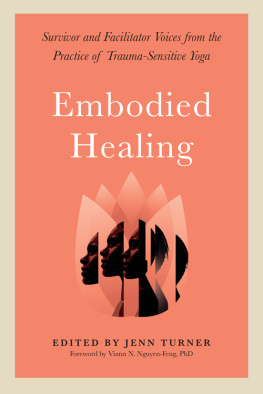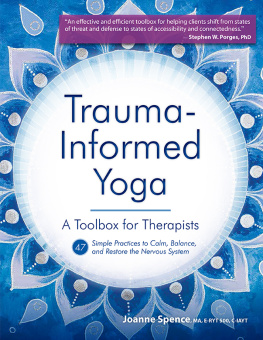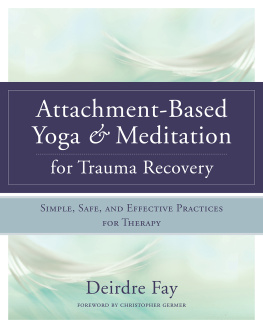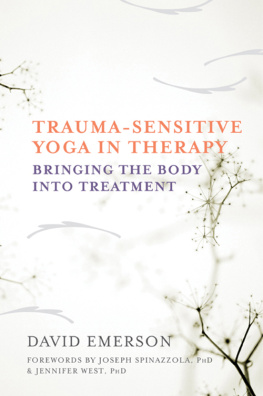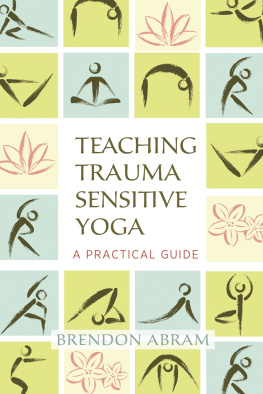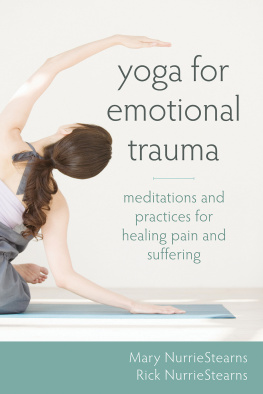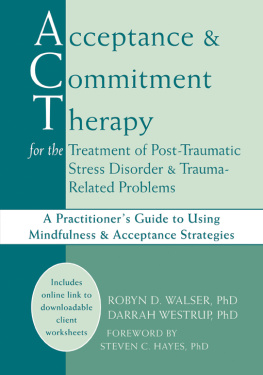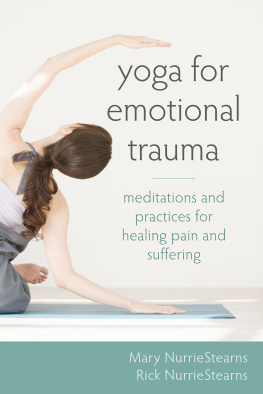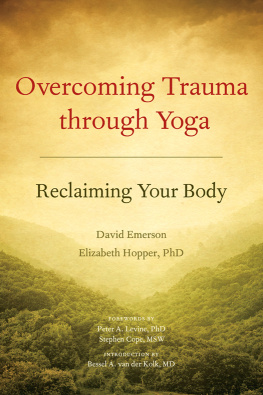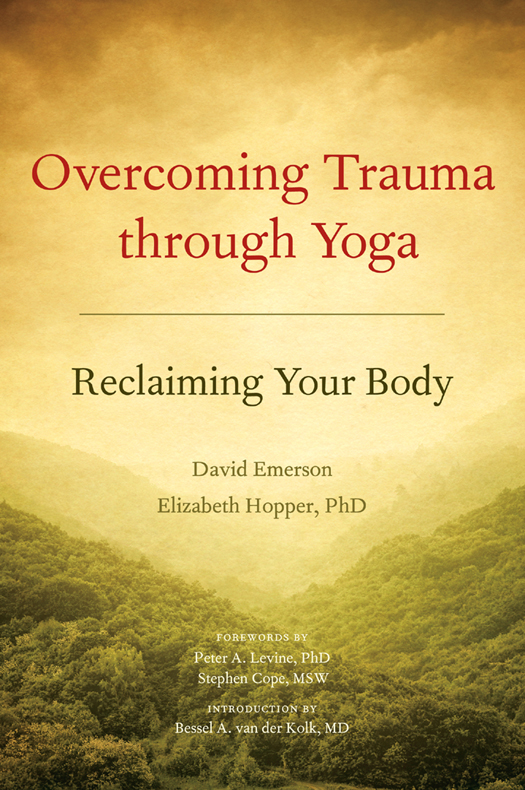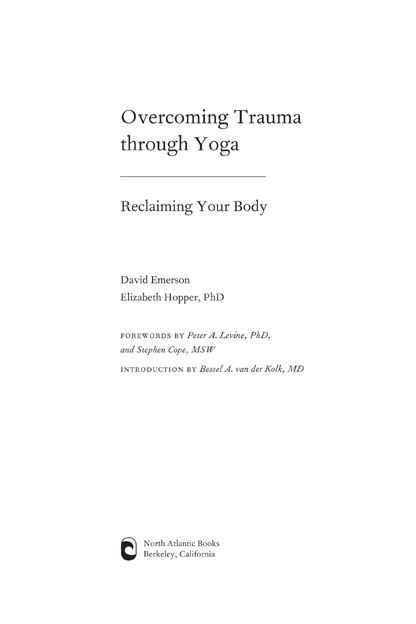eISBN: 978-1-58394-533-9
Copyright 2011 by Justice Resource Institute, Inc. All rights reserved. No portion of this book, except for brief review, may be reproduced, stored in a retrieval system, or transmitted in any form or by any meanselectronic, mechanical, photocopying, recording, or otherwisewithout the written permission of the publisher. For information contact North Atlantic Books.
Published by
North Atlantic Books
P.O. Box 12327
Berkeley, California 94712 | and | The Trauma Center at Justice Resource Institute, Inc.
545 Boylston St., Suite 700
Boston, MA 02116 |
Cover photo iStockphoto.com/Peter Zelei
Overcoming Trauma through Yoga: Reclaiming Your Body is sponsored by the Society for the Study of Native Arts and Sciences, a nonprofit educational corporation whose goals are to develop an educational and cross-cultural perspective linking various scientific, social, and artistic fields; to nurture a holistic view of arts, sciences, humanities, and healing; and to publish and distribute literature on the relationship of mind, body, and nature. This book is co-sponsored by the Trauma Center, a national expert research, training, and service center dedicated to unraveling the complex effects of psychological trauma and developing state-of-the-art treatment for impacted children and adults. The Trauma Center is a program of Justice Resource Institute, a nonprofit organization whose mission is to pursue social justice through empowering underserved individuals and communities through cultivation of strength, well-being, and autonomy.
North Atlantic Books publications are available through most bookstores. For further information, visit our website at www.northatlanticbooks.com or call 800-733-3000.
The Trauma Center offers a wide range of educational materials for survivors of traumatic events and multidisciplinary service providers. For further information, visit our website at www.traumacenter.org or call 617-232-1303.
MEDICAL DISCLAIMER: The following information is intended for general information purposes only. Individuals should always see their health care provider before administering any suggestions made in this book. Any application of the material set forth in the following pages is at the readers discretion and is his or her sole responsibility.
Library of Congress Cataloging-in-Publication Data
Emerson, David, 1969
Overcoming trauma through yoga: reclaiming your body / David Emerson, Elizabeth Hopper.
p. cm.
1. Psychic traumaPhysical therapy. 2. YogaTherapeutic use. I. Hopper, Elizabeth,
1973 II. Title.
RC552.T7E44 2010
616.852106dc22
2010030105
v3.1
We would like to dedicate this book
to survivors of trauma everywhere.
Acknowledgments

I WOULD LIKE TO THANK Richard Grossinger and Lindy Hough at North Atlantic Books for being so kind and generous and for believing in our topic. I would also like to thank Jessica Sevey specifically along with everyone else at North Atlantic Books who had a hand in this final productwhat a fantastic, patient, and professional group! Thanks to Dana Moore, Jodi Carey, and Jenn Turner for their specific contributions to the development of the Trauma Center Yoga Program and to all of the other wonderful yoga teachers who have been involved with the program. Deep gratitude to Bessel A. van der Kolk for being a champion of yoga in the field of trauma and for being somebody whom I am proud to call teacher. To everyone at the Trauma Center, Joseph Spinazzola, Margaret Blaustein, and Ritu Sharma in particular, thank you for supporting me and nurturing the yoga program with your tremendous intelligence and generosity. Finally, thank you to my family, especially Mandy and Hazen, and to my friends for supporting me throughout the writing process and for giving me a reason to get up each day.
David Emerson
I would like to thank my mentors and colleagues at the Trauma Center for guiding and supporting my learning about trauma treatment, and for giving me my professional home. Thanks to Dave for his calm presence, enthusiasm, and kind spirit in his leadership of our yoga program. Thank you to the therapists and yoga instructors who have attended our workshops, and to the women and men who have attended our yoga classes, for generously sharing their own experiences and giving us much food for thought. Many thanks to our executive director, Joseph Spinazzola, for his invaluable contributions to our manuscript and for supporting this project from start to finish. I also want to thank my clients, who have shown such strength and resiliency, and who are my greatest teachers.
Elizabeth Hopper
Contents

Foreword

YOGA HAS BEEN PRACTICED in the East for thousands of years, and its adepts have claimed numerous benefits: physical, emotional, and spiritual. Until recently, however, these effects have not been quantified scientifically. With Bessel A. van der Kolks compelling research on the efficacy and positive physiological effects of yoga in trauma recovery, a vital new application for this ageless health-promoting method has been revealed. This should be of no surprise when we realize that a common denominator of all traumas is an alienation and disconnection from the body and a reduced capacity to be present in the here and now. Indeed, some survivors of trauma are attracted to yoga classes. However, many more would be overwhelmed by a room full of other people deep-breathing, sweating, chanting, and straining into seemingly impossible body postures.
In this landmark book the authors bridge this gap and offer survivors a gentle, step-by-step, mindful yoga that is tailored for their specific needs. They help survivors to develop a trauma-sensitive yoga practice that they can apply in the safety of their own homes. Overcoming Trauma through Yoga begins with a clear, accurate, and informative summary of what trauma is. It dispels common myths about trauma and invites understanding and self-compassion. The authors then help the reader to encourage present-moment experience, to learn about making choices from inner impulses, to move rhythmically within themselves, and to interact positively with others.
The next phase of the book encourages therapists to practice yoga themselves and then helps these clinicians integrate yoga-based practices into their therapy practice.
Finally, there is an informative section for yoga instructors to help them design trauma-sensitive yoga classes. The authors discuss how teachers can create a safe environment through the use of invitational, exploratory, and accepting language to promote inner experiencing. Further, they describe the qualities teachers need to cultivate in order to work effectively with traumatized students. They also give valuable advice on what to do if students are triggered in their traumatic reactions by different yoga postures and breathing patterns. In this way the risks of retraumatization are greatly reduced while healing possibilities are enhanced.


